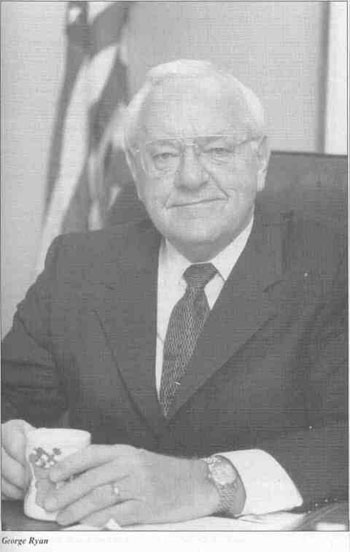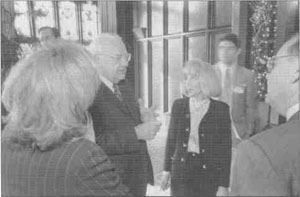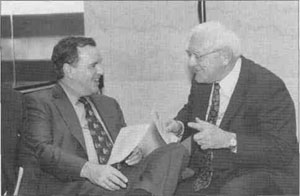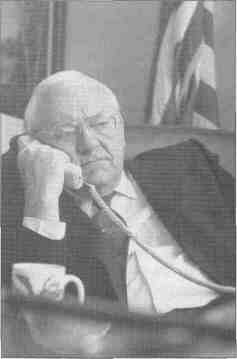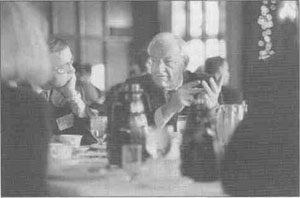|
A MAN FOR THE MILLENNIUM?
REPUBLICAN GEORGE RYAN HAS SPENT DECADES As a House Republican staffer in the late 1970s, David Olien occasionally needed to travel to Kankakee to confer with his boss, then-Minority Leader George H. Ryan. Olien says he would find Ryan hard at work behind the counter of his family-owned pharmacy, waiting on customers and filling prescriptions. "He took time with individual people, especially older people, to explain the medication," marvels Olien, now senior vice president for administration at the University of Wisconsin. "George took it very seriously. I remember he was concerned about [possible side effects from] interaction between medicines before it was fashionable." The image of Secretary of State George Ryan as an attentive practitioner of the healing arts might come as a surprise to those who see him after 25 years in Springfield as a gruff old-style political healer. But, friends say, to understand Ryan's political success, it helps to remember his roots as a small-town druggist who made his living by meeting the public every day and taking an interest in individual needs. Those old-fashioned traits will be put to the test between now and November as Ryan attempts to extend the GOP'S 22-year hold on the Executive Mansion, a streak that started when another apparently popular veteran, Democratic Secretary of State Michael Howlett, got rolled in his bid for governor by a young and hungry Jim Thompson. That benchmark is apt. Howlett, backed by the Chicago Democratic Machine, was never able to shake his image as an old-style pol. George Ryan faces a similar challenge. He came of age politically at a time when politics, like the pharmacy business, was retail, politician to voter. It's now a wholesale enterprise, with candidates skillfully packaged and programmed to project a favorable persona to thousands of voters. Ryan has steadily built a record of accomplishment in statewide office, particularly as secretary of state, but he's had the luxury of choosing his issues, and most of his choices — drunk driving, lobbyist disclosure, organ donation — have been safely popular. As a candidate for governor, Ryan must now have a polished position on every issue, including education funding, taxes and welfare. He says he can salve the wounds of political infighting and bring "an end to partisan bickering and government gridlock," drawing on the skills he has honed as a legislator, lieutenant governor and secretary of state, and he says he has the experience to cut the deals that make government work. Yet over the years voters have grown suspicious of deal-making. He has roots deep in the political culture of Illinois — to the victor go the spoils — and he has been criticized for his love of the perks, for his eagerness to dispense favors from an office renowned for its political bounty. But he now will face the intensified scrutiny of a press looking for and a public fed up with the tiniest breach of political propriety. Despite a brusque public demeanor, Ryan can be an amiable, even charming person in close encounters. But in the coming months, he will be tested as never before as opinion about him is shaped and reshaped by the unblinking eye of the television camera and the well-focused critique of an opponent's ad campaign. Indeed, the public will get a second look, or maybe its first real look, at Ryan as he attempts to move up from his middle-echelon post to the state's highest political job. 20 / February 1998 Illinois Issues
Illinois Issues February 1998 / 21
But Ryan says he recognizes that to some extent he will have to reintroduce himself in the coming year to voters who haven't always paid him that much attention. One of the first things they'll learn is that this traditional politician is grounded in traditional family values. Ryan was born in February 1934 in Maquoketa, Iowa, where his mother's family was in the cattle business. His father's father worked for the railroad. Thomas Ryan earned a degree from the University of Iowa within a few months of George's birth and took a job with Walgreens Drug Co. Walgreens posted him briefly at a drugstore on Chicago's South Side at 79th and Stony Island (giving candidate Ryan a claim to Chicago roots) before transferring him to Kankakee. Thomas Ryan opened his own independent pharmacy in 1948, and George, then a high school freshman, says he worked in the store during his lunch hour, pouring sodas and washing dishes. On Saturdays, he scrubbed the floor. That same year, he met his wife-to-be, Lura Lynn. They raised six children. "I worked the fountain and realized that if I was ever going to be an owner of the pharmacy I had to be a
22 / February 1998 Illinois Issues pharmacist," Ryan says of his decision to follow in his father's footsteps, picking up his degree from Ferris State College in Big Rapids, Mich. He also says, "I love my father dearly, but I'll never forgive him for sending me to pharmacy school instead of law school." A moment later he adds, "I'm only kidding," but leaves his interviewer to wonder. Ryan says his pharmaceutical career "taught me a lot about life, about public service." At one point, there were four Ryan family members operating their chain of four pharmacies in the Kankakee area: Thomas, George, a brother, Tom, and their sister's husband. It was the pharmacy trade that made the Ryan family a trusted commodity in Kankakee and paved the way for an entry into politics. But it wasn't George who jumped into public life first. That was brother Tom, who won the Kankakee mayor's office in 1965 and hung on to it for 20 years before being defeated. Not long after his brother's first election, though, Ryan took the leap into politics, accepting an appointment to fill a vacancy on the Kankakee County Board. He remained there for six years, ascending to the chairmanship before moving on to Springfield as a representative from the 43rd District. Kankakee must have been a good training ground because after just four years in the House, Ryan's Republican colleagues made him minority leader. Four years after that, when the GOP captured a thin majority in the 1980 elections, Ryan was made speaker. "In the right place at the right time" is how Ryan explains his fast rise. He won the speakership with a coalition of downstaters and Chicago Republicans, the odd ducks created by the old three-member districts. Ryan had met two of those city Republicans, Art Telcser and Pete Peters, in Gov. Richard Ogilvie's 1968 campaign. They remain among his closest pals, although Telcser, a fellow pharmacist, is in poor health. 'If I made a deal, if that's the right word, I lived up to my word,' Ryan says.
One of those coalitions approved a major reform of the state's unemployment insurance laws. Another eased government regulation of small businesses. Ryan lists those as the top highlights of his legislative career. He admits it was easier in those days to forge a coalition because of the three-member districts, which allowed Democrats and Republicans from the same district to vote alike without giving the other side campaign ammunition for the next election. Still, Ryan developed a style, a reputation and know-how. "If I made a deal, if that's the right word, I lived up to my word," Ryan says. Deal-making is often exaggerated, he says. Sometimes, all a legislator wanted in exchange for his vote was a new secretary, a second phone in his office or a different committee assignment. "People think there's something sinister about deals," says Ryan, who still speaks admiringly of the day the late Chicago Mayor Richard J. Daley set up court in a back room of the House chamber to line up votes for a Chicago school funding bill. The bill lost, Ryan recalls, but Daley kept all his promises just the same. "George has always loved being a player," says Mike Lawrence, who covered Ryan as a newspaper reporter before becoming Jim Edgar's press secretary. "He's not an ideologue. He's a pragmatist," says Lawrence, now Illinois Issues February 1998 / 23 associate director of the Public Policy Institute at Southern Illinois University. "The kind of people who tend to become governor of Illinois are not ideologues." Yet Ryan has often been portrayed as a conservative. Does he consider himself a conservative? "What is a conservative?" Ryan asks. "I'm a conservative, I guess like everybody else, on some issues and maybe not so conservative on others." He says he would characterize himself as a "fiscal conservative" and a "social moderate, to some degree." Ryan might get some disagreement on that self-assessment from women's groups who fought him on the Equal Rights Amendment. To his chagrin, the ERA is the issue for which Ryan's legislative career is always best remembered. Illinois was a key target state in the unsuccessful effort to get enough states to ratify the ERA, which would have amended the U.S. Constitution to establish gender equality under the law. As the amendment closed in on a 1982 ratification deadline, Ryan was in the hot seat as speaker of the House and an ERA opponent. ERA supporters pressed Ryan to
allow a procedural change that would enable the constitutional amendment to be ratified with a simple majority instead of the three-fifths vote required under the legislature's rules. But Ryan blocked the change, a position he thinks those more liberal than he should have come to appreciate later when others tried to advance conservative amendments to the Constitution, including one requiring school prayer. He protests that his role in killing the ERA has been overstated, noting the state's Democratic legislative leaders were no more successful in the years they held a majority. He brought the matter to a vote 13 times and contends he never used the power of his position to bend other lawmakers to his point of view. "The media has really botched this and given me either credit or blame where I'm not sure it's deserved in either case," Ryan says. "People say Ryan was anti-woman. I've got five daughters, and I'm very interested in their well-being. They're all mothers, and they all work second jobs, so I think I have a pretty good understanding of what they go through and what it means for them to juggle a schedule and a job and to be involved. So anybody who says I'm anti-woman is goofy." But Ryan glosses over the fact that he was anti-ERA. "My voter base was opposed to it," he explains when pressed, citing polls from his district at the time. "I didn't believe it was a panacea for women. I thought it would have created more problems than it would have solved. It would have been a lawyer's paradise for lawsuits." Some think a better description for Ryan than anti-woman is old-fashioned. There's nothing malicious. He just doesn't get modern attitudes on women's issues. To dispel that notion, Ryan is staking out domestic violence as a key issue for his campaign, promising more state resources for shelters and law enforcement efforts.
Ryan, though, says he expects the forthcoming campaign to be decided on other issues, and toward that end he's polishing up his positions. On recently passed school funding legislation: 24 / February 1998 Illinois Issues "I want to see how this all falls out. For right now, as far as dollars are concerned, I think that it's okay. Does that mean that we're not going to need more dollars down the road or are more dollars ever the answer to the education problem? Those are things you have to consider and watch. What I've found is you can't please everybody with education programs. It's very difficult to do because you have so many varying interests. You have to strike a middle ground." On his ideas for education reform: "We're going to save them for the campaign." On state tax increases: "I suppose the smart political thing would be to say, 'There will be no increase in the income tax while I'm governor.' But I don't think that's good government. I don't think that's good politics. I don't know what two years, three years down the road holds. My intention right now is not to increase the income tax or to increase any tax, frankly. But to make a pledge that I wouldn't do that would be irresponsible. If I can figure out a way to cut taxes, that's what I'll do." On property tax relief: "We have to get some of the best minds available and sit down and see if there's a way we can do that. Do we need property tax relief? Sure we do. Do I have the magic solution? No." On expansion of legalized gambling: "I'm not for casino expansion in Illinois." On riverboats for Cook County: "I don't think there should be river- boats in Cook County. Can you imagine 15 riverboats in the Chicago River? That would be a disaster." On land-based casinos in Chicago: "I think it's something that ought to be studied and looked at. That doesn't mean I'm for it. I don't know whether land-based would work or wouldn't, but it isn't something I'm going to close my mind about."
It still makes Ryan mad when questions are raised about his need as secretary of state for a bodyguard detail, which he won't give up. "Absolutely I feel threatened," he says. "It isn't just me. It's anybody in public life. We're targets constantly." The use of bodyguards is one of those subjects that brings out a side of Ryan the news media has often depicted as gruff, a term his wife also once used in a newspaper profile. "I don't know. What's gruff?" responds Ryan. "Maybe I am. I don't know. My voice is deep, and I say a lot of things and maybe in a gruff fashion. I know when I really want to get tough I can do that." Springfield lobbyist Zale Glauberman, a longtime member of Ryan's brain trust currently under contract to the secretary of state, says Ryan's occasional public grumpiness compensates for a natural shyness and masks a "heart of gold." "He hates to talk about himself," Glauberman says. One thing Ryan likes to talk about even less is comparisons to Howlett, who wasn't able to make the major leap that is required to move up from a campaign for secretary of state to a campaign for governor, where the news media watch your every word and your opponent spends millions of dollars to sell the public an unflattering image of you. "What's the Mike Howlett comparison?" Ryan grumps. "That we look alike? He was fat and I was fat? I think Mike Howlett was a good public servant, and he did a good job. I suppose if I lose, that'll be the comparison." Then he brightens a bit. "I think Mike Howlett kind of self-destructed, if I remember correctly," Ryan says, signaling that he has no intention of doing the same. Mark Brown is a reporter for the Chicago Sun-Times. Illinois Issues February 1998 / 25
|

